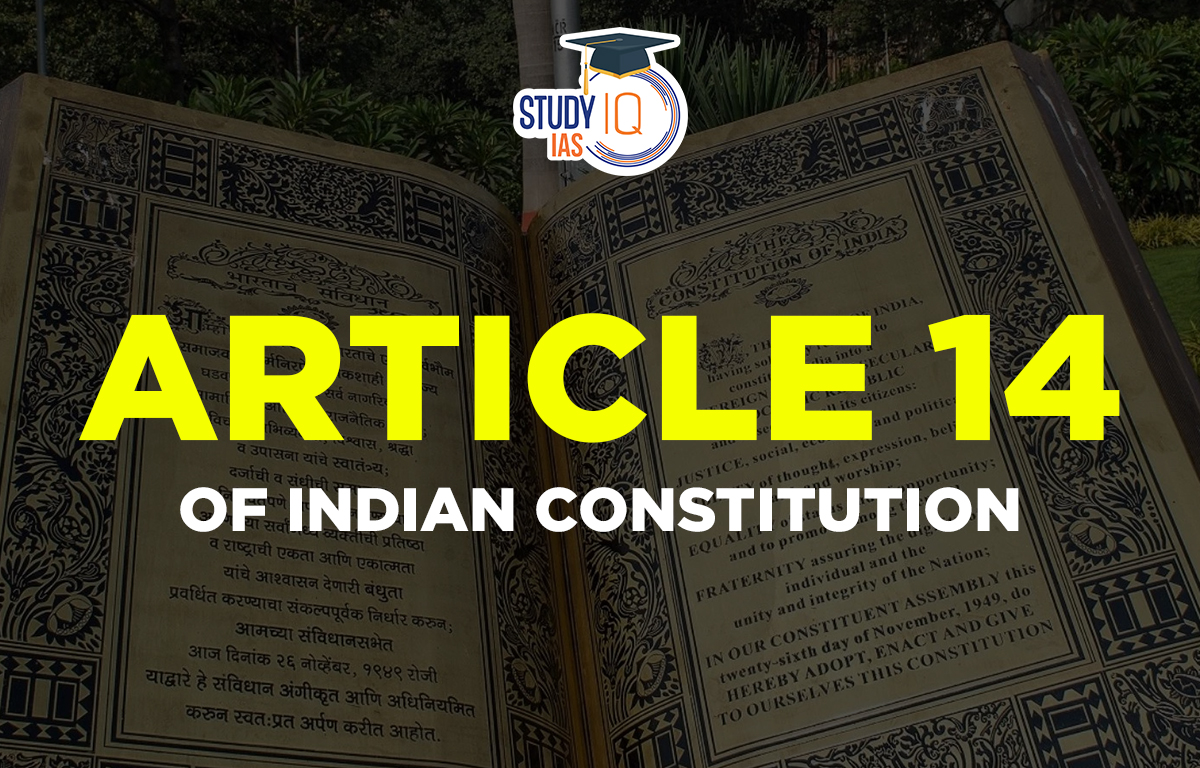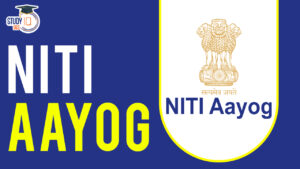Table of Contents
Article 14 of Indian Constitution
Our nation is still unable to achieve true freedom even after 73 years of independence. Discrimination and other evils still exist in our land. This taboo even affected the intention of the constitution makers or authors of our Constitution of India. Even today, some places still have discrimination based on religion, race, gender, caste, and nationality. Liberals believe everyone should be treated equally, and Article 14 of the Indian Constitution guarantees this protection for all citizens. The amount of equality a person experiences in society is inversely connected to the amount of freedom they have. Positive and negative equality are both included in the Right to Equality.
| Article 14 |
It states that “the State shall not deny any person equality before the law or equal protection of the laws within India.” This means everyone, whether a citizen or a foreigner, has the same rights under the law. The terms “equality before the law” and “equal protection of the law” emphasize this idea.
Equality Before the Law (British origin):
Equal Protection of the Law (American origin):
Differential Treatment: The Supreme Court says Article 14 does not apply when equals and unequal are treated differently. It allows reasonable classification of people and situations, but this should not be arbitrary. Rights: Article 14 grants rights to everyone, including citizens, foreigners, and legal entities. Rule of Law (by A.V. Dicey):
Exceptions to Equality:
|
Read More: Articles 12 and 13
Article 14 in the Constitution Of India
Equality Before Law: Within the territory of India, the State shall not deny to any person equality before the law or the equal protection of the laws.
Click here to Know about 6 Fundamental Rights of Indian Constitution
Equality Before Law & Equal Protection of Laws
| Parameters | Equality Before Law | Equal Protection of Laws |
| Implication | No special privileges: Absence of special privileges in favour of any person,
Law of the land: Equal subjection of all persons to the ordinary law of the land administered by ordinary law courts. Law is paramount: No person (whether rich or poor, high or low, official or non-official) is above the law. |
Equal treatment: Equal treatment in similar circumstances, both in the privileges and liabilities imposed by the law.
Similar application: The similar application of the same laws to all persons who are similarly situated. Like should be treated alike: The like should be treated alike without any discrimination. |
| Origin | This concept is of British origin. | This concept is from the US Constitution. |
| Nature | Negative concept: Equality Before the Law is a negative concept as it implies the absence of any special privilege in favour of individuals. | Positive obligation: It is a positive obligation under which the state brings about necessary social and economic changes, to ensure every person enjoys equal protection. |
Read about: Important Articles of Indian Constitution
Article 14 of Indian Constitution: Rule of Law
The notion of equality before the law is a part of the “Rule of Law” concept. The Supreme Court ruled that the phrase “rule of Law” in Article 14 is a “basic component of the constitution.”
The principle of ‘Rule of Law’ was propounded by the British jurist A.V. Dicey. His concept has the following three elements or aspects:
- No Arbitrary Power: There should be an absence of arbitrary power, that is, no man can be punished except for a breach of law. An offence should be proved before the ordinary courts to punish a person according to legal procedure. This is applicable in the Indian system.
- Equality Before Law: Equality before the law is the subjection of all citizens, regardless of class (i.e., rich or poor, high or low, official or not), to the common law of the state as applied by ordinary law courts. This is true for the Indian system.
- Source of Individual Rights: Dicey believed that there should be an enforcing authority to effectively enforce the above two principles. According to Dicey, courts should be the enforcing authority. The constitution was created as a result of how the courts of law established and upheld individual rights, not the other way around. It held that the court of law is the source of individual rights. This provision is not applicable in the Indian system as India has a written constitution, which is the source of individual rights.
Read More: Salient Features of Constitution of India
Article 14 of Indian Constitution Exceptions
There are constitutional and other exceptions to the general concept of equality before the law and it is not an absolute right. These are mentioned below:
Constitutional Heads
Under Article 361 the President of India and the Governor of States enjoy the following immunities:
| Conditions | Immunities Provided |
| Performance of duties | The President or the Governor is not answerable to any court for the exercise and performance of the powers and duties of the office. |
| Criminal proceeding | No criminal proceedings shall be instituted or continued against the President or the Governor in any court during his term of office. |
| No imprisonment | No process for the arrest or imprisonment of the President or Governor shall be issued from any court during his term of office. |
| Provision with regard to civil proceedings | No civil proceedings against the President or the Governors are instituted during his term of office in any court in respect of an act done by him in his personal capacity, whether before or he entered upon his office until the expiration of two months and after notice has been delivered to him. |
Reporting Proceedings of the Parliament
Regarding the publication in a newspaper (or by radio or television) of a basically true report of any proceedings of either House of Parliament or either House of the Legislature of a State, no individual shall be subject to any civil or criminal proceedings in any court.
Parliamentary Proceeding
No member of Parliament shall be liable to any proceedings in any court in respect of anything said or any vote given by him in Parliament or any committee thereof.
State Legislature Proceeding
No member of the Legislature of a state shall be liable to any proceedings in any court in respect of anything said or any vote given by him in the Legislature or any committee thereof.
Provisions under Article 31C
It provides that the laws made by the state for implementing the Directive Principles contained in clause (b) or clause (c) of Article 39 cannot be challenged on the ground that they violate Article 14. “Where Article 31-C comes in, Article 14 goes out,” the Supreme Court ruled.
Foreign sovereigns (rulers), ambassadors, and diplomats are exempt from prosecution in both civil and criminal courts. The member of the United Nations Organisation and its agencies are protected under diplomatic immunity.
Case Laws
- Devika Biswas vs. Union of India: Policies on family planning should be gender-neutral.
- K.A. Abbas vs. Union of India: The classification of films into categories is reasonable due to their unique impact.
Doctrine of Legitimate Expectation
This doctrine allows individuals to expect consistent treatment based on past practices or promises from authorities.
Application of Law
Article 14 does not require uniform laws across the country; laws can apply differently in various states or regions based on specific needs. For instance, in Krishna Singh vs. State of Rajasthan, a law specific to the Marwar region was upheld as justifiable.


 NITI Aayog Report on India’s Hand and ...
NITI Aayog Report on India’s Hand and ...
 9th Schedule of Indian Constitution: His...
9th Schedule of Indian Constitution: His...
 Mechanisms to Combat Judicial Corruption...
Mechanisms to Combat Judicial Corruption...





















